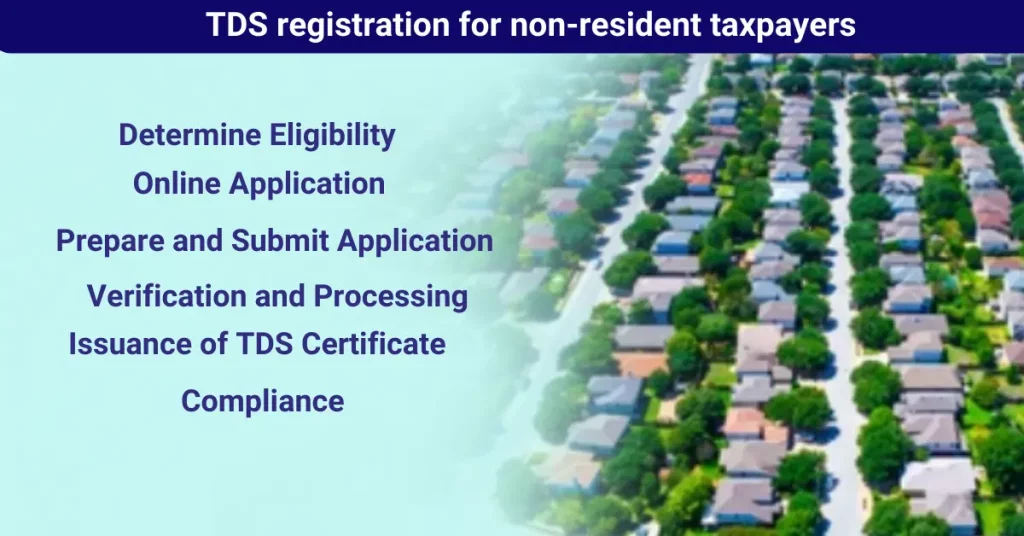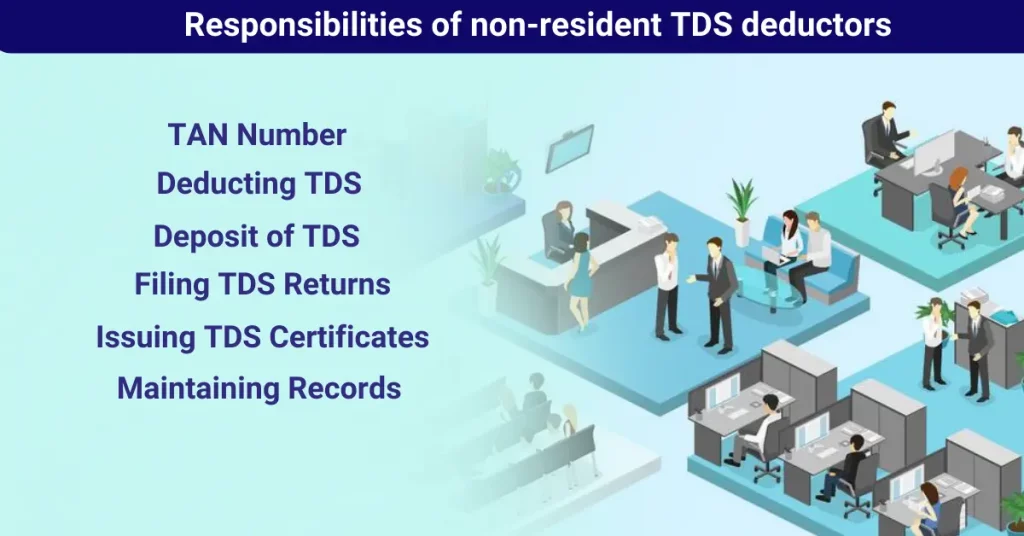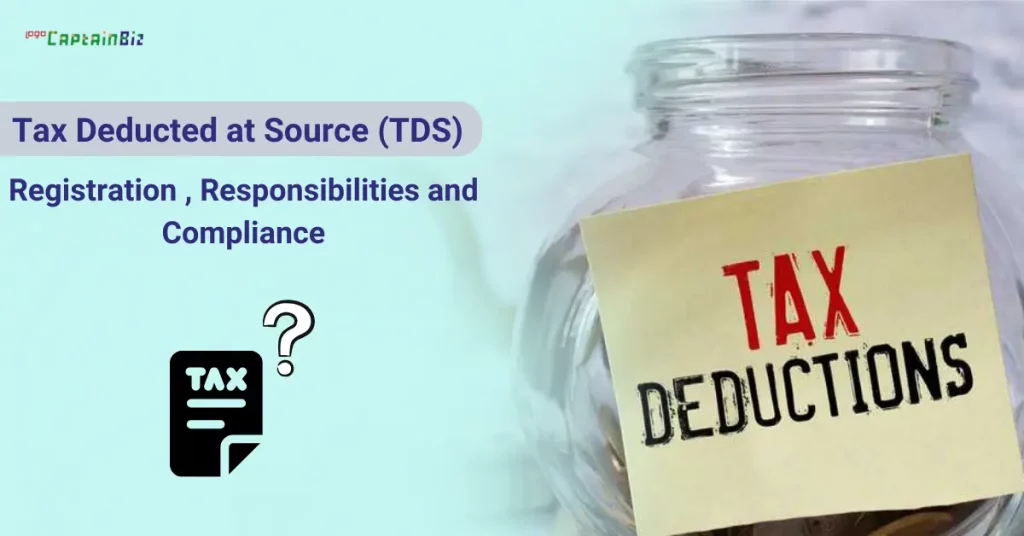TDS, or Tax Deducted at Source, is a method of collecting taxes upfront from income sources to prevent tax evasion and ensure fair tax distribution. Non-Resident Indians (NRIs) can register for TDS online in India to fulfill their tax obligations. This discussion will focus on TDS registration, responsibilities, and compliance for NRIs, aiming to provide clarity on tax laws and procedures. Understanding TDS is essential for both NRIs and Indian tax authorities to maintain fiscal discipline and transparency in financial transactions, thereby fostering compliance with tax regulations and enhancing revenue collection efficiency.
TDS registration for non-resident taxpayers

Here’s the step by step process:
- Determine Eligibility: Non-resident taxpayers need to determine whether they are required to deduct TDS in India based on their activities and income sources. If they are liable to deduct TDS as per the Income Tax Act, they need to proceed with the registration process.
- Online Application: The registration for TDS deduction in India is done online through the TRACES (TDS Reconciliation Analysis and Correction Enabling System) website maintained by the Income Tax Department of India. Non-resident taxpayers need to access the TRACES portal and fill out the online registration form for TAN (Tax Deduction and Collection Account Number) application.
- Obtain Tax Deduction Account Number (TAN): Non-resident taxpayers who are liable to deduct TDS in India must obtain a Tax Deduction Account Number (TAN) by submitting Form 49B to the Income Tax Department.
- Prepare and Submit Application: The non-resident taxpayer must prepare and submit an application for TDS registration to the jurisdictional Assessing Officer (AO) or the TDS Range Officer using Form 13. This form is available on the official website of the Income Tax Department.
- Provide Necessary Documents: Along with the application form, the taxpayer needs to provide supporting documents such as proof of identity, address, PAN (Permanent Account Number), and any other documents as required by the tax authorities.
- Verification and Processing: Once the application is submitted, the tax authorities will verify the details provided and process the application. They may request additional information or documents if necessary.
- Issuance of TDS Certificate: After successful registration, the tax authorities will issue a TDS certificate to the non-resident taxpayer. This certificate is proof of registration and contains the TAN details.
- Compliance: Upon obtaining TDS registration, non-resident taxpayers are required to comply with the TDS provisions under the Income Tax Act. This includes deducting TDS at the applicable rates, depositing the TDS amount to the government treasury within the prescribed due dates, and filing TDS returns as per the specified schedule.
Responsibilities of non-resident TDS deductors

The responsibilities of non-resident TDS deductors entail various duties and obligations related to deducting tax at source from payments made to non-resident taxpayers. Here are some of the key responsibilities:
- Obtaining Tax Deduction Account Number (TAN): Non-resident TDS deductors are required to obtain a Tax Deduction Account Number (TAN) from the Income Tax Department. This unique 10-digit alphanumeric code is necessary for deducting and depositing TDS.
- Deducting TDS: Non-resident TDS deductors are responsible for deducting the applicable TDS from payments made to non-residents at the prescribed rates. They must ensure compliance with TDS provisions specified under the Income Tax Act, 1961, and relevant Double Taxation Avoidance Agreements (DTAA) or tax treaties, if applicable.
- Deposit of TDS: After deducting TDS, non-resident TDS deductors must deposit the deducted tax amount to the government within the stipulated time frame. They are required to remit TDS to the credit of the Central Government using the relevant challan and quoting the TAN.
- Filing TDS Returns: Non-resident TDS deductors must file periodic TDS returns as per the prescribed due dates. These returns contain details of TDS deducted and deposited during the relevant period. The filing of TDS returns can be done online through the Income Tax Department’s e-filing portal.
- Issuing TDS Certificates: Non-resident TDS deductors are responsible for issuing TDS certificates (Form 16A or Form 16B) to the non-resident payees from whom TDS has been deducted. These certificates provide details of the tax deducted and deposited, which the payees can use for claiming credit of TDS while filing their tax returns.
- Compliance with Reporting Requirements: Apart from filing TDS returns, non-resident TDS deductors may be required to comply with additional reporting requirements prescribed under Indian tax laws. This may include furnishing information in specified formats or responding to notices issued by the tax authorities.
- Maintaining Records: Non-resident TDS deductors must maintain proper books of account and other relevant documents to support the TDS deductions and compliance with applicable tax laws. These records should be preserved for the period prescribed under the law.
TDS compliance requirements for non-resident taxpayers

TDS (Tax Deducted at Source) compliance requirements for non-resident taxpayers in India are governed by the provisions of the Income Tax Act, 1961, as well as any applicable Double Taxation Avoidance Agreements (DTAA) or tax treaties. Here are the key compliance requirements for non-resident taxpayers regarding TDS:
- TDS Deduction: Non-resident taxpayers must ensure that tax is deducted at source from payments received by them, as per the rates specified by the tax laws. They need to identify whether TDS is applicable to the payments they receive and deduct tax accordingly.
- Obtaining PAN or TAN: Non-resident taxpayers may need to obtain a Permanent Account Number (PAN) if they are eligible for it, or a Tax Deduction and Collection Account Number (TAN) if they are required to deduct TDS from payments made to residents or other non-residents.
- Deducting TDS: If a non-resident taxpayer is liable to make payments subject to TDS under the Income Tax Act or DTAA, they are required to deduct TDS from such payments at the prescribed rates. This includes payments such as salary, interest, royalties, fees for technical services, etc.
- Deposit of TDS: After deducting TDS, non-resident taxpayers must deposit the deducted tax amount to the Indian government within the stipulated time frame. TDS should be remitted to the credit of the Central Government using the relevant challan and quoting the TAN.
- Filing TDS Returns: Non-resident taxpayers who have deducted TDS are required to file periodic TDS returns as per the prescribed due dates. These returns contain details of TDS deducted and deposited during the relevant period. The filing of TDS returns can be done online through the Income Tax Department’s e-filing portal.
- Issuing TDS Certificates: If TDS has been deducted by a non-resident taxpayer, they are responsible for issuing TDS certificates (such as Form 16A or Form 16B) to the payees from whom TDS has been deducted. These certificates provide details of the tax deducted and deposited, which the payees can use for claiming credit of TDS while filing their tax returns.
- Compliance with Reporting Requirements: Non-resident taxpayers may be required to comply with additional reporting requirements prescribed under Indian tax laws. This may include furnishing information in specified formats or responding to notices issued by the tax authorities.
- Maintaining Records: Non-resident taxpayers must maintain proper books of account and other relevant documents to support TDS deductions and compliance with applicable tax laws. These records should be preserved for the period prescribed under the law.
Also Read: Mastering TDS Compliance: Standard Operating Procedure For TDS Under GST
TDS withholding and deposit procedures for non-residents
The TDS withholding and deposit procedures for non-residents involve several steps to ensure that tax is deducted at source from payments made to non-residents and deposited with the government in a timely manner. Here’s an overview of these procedures:
- Determine TDS Applicability: Non-residents and resident deductors ascertain whether TDS is relevant to payments, considering the Income Tax Act’s provisions and tax laws.
- Calculate TDS Amount: Following the determination of applicability, accurately compute the TDS amount to be deducted based on payment nature, recipient residency, and applicable tax rates.
- Deduct TDS: The deductor, whether resident or non-resident, deducts the calculated TDS amount from the payment made to the non-resident recipient.
- Deposit TDS Amount: Timely remittance of the deducted TDS amount to the government through designated banks using generated payment challans is ensured by the deductor.
- Generate Challans: Challans containing essential details such as deductor’s TAN, TDS amount, and payment particulars are generated online or offline at designated bank branches.
- Payment of TDS: Through approved methods like online banking or NEFT, the deductor completes the TDS payment, adhering to specified deadlines.
- Filing TDS Returns: Electronically submitting TDS returns with the tax authorities within stipulated timeframes, containing comprehensive details of TDS transactions during the period.
- Issuing TDS Certificates: Providing non-resident recipients with TDS certificates, furnishing particulars of deducted and deposited TDS amounts, facilitating their tax credit claims efficiently.
TDS return filing and challan generation for non-residents
A TDS return is a quarterly statement submitted by the deductor to the Income Tax Department of India, detailing tax paid on income during that quarter. It includes:
- PAN & TAN numbers of employee & employer
- TDS challan information
- Details of TDS paid
Quarterly due dates:
- Quarter 1: July 31
- Quarter 2: October 31
- Quarter 3: January 31
- Quarter 4: May 31
Deductor’s responsibility includes deducting TDS, filing returns, and submitting supporting documents quarterly. The type of TDS form (24Q, 26Q, 27Q, 27EQ) depends on the nature of income.
To understand challan: A Challan is like a receipt paper used for official stuff in your system.
Follow these steps:
- Go to “Challans” and select the correct return form (24Q, 26Q, 27Q, or 27EQ).
- Fill in Challan details:
- Challan/Voucher No.
- Date of deposit (when you paid at the bank).
- Cheque/DD No.
- BSR Code (7-digit code for bank).
- Select if deposit was by Book Entry.
- Receipt No. 24G (5-digit number from bank).
- Select Challan type (200, 400, or 100).
- Enter Amount details:
- TDS Amount (paid).
- Surcharge amount.
- Health & Education Cess.
- Interest amount.
- Fee.
- Penalty/Other amount.
- System shows Total Tax Amount.
- If you’ve already paid the Challan online, you can import it from the Government website to avoid manual entry.
Adherence to TDS regulations and penalties for non-compliance
Adhering to TDS (Tax Deducted at Source) regulations is crucial to avoid penalties for non-compliance. Here’s how to ensure compliance:
- Understand TDS Requirements: Familiarize yourself with TDS provisions under the Income Tax Act applicable to your transactions and income sources.
- Deduct TDS Correctly: Deduct TDS at the prescribed rates and on time from payments made to vendors, contractors, employees, etc.
- Timely Deposit: Ensure timely deposit of TDS deducted into the government’s account within the specified due dates.
- File TDS Returns: File TDS returns accurately and within the prescribed due dates using the correct forms and details.
- Verification of PAN: Verify the PAN (Permanent Account Number) of the deductee to avoid any errors in TDS deductions and filings.
- Retain Records: Maintain proper records, including TDS certificates, challans, and other relevant documents, for future reference and audits.
- Regular Compliance Checks: Conduct regular checks to ensure compliance with TDS provisions and make necessary adjustments if any discrepancies are found.
Penalties for non-compliance with TDS regulations may include:
- Late filing of TDS returns: Penalty ranging from ₹200 to ₹10,000 for each day of delay, depending on the period of delay.
- Late payment of TDS: Interest levied on the delayed payment of TDS.
- Incorrect filing: Penalty for furnishing incorrect information or failing to furnish information in TDS returns.
- Non-deduction or short deduction of TDS: Penalty of the amount equal to the tax not deducted or deducted but not paid to the government.
Conclusion:
In conclusion, understanding and fulfilling TDS responsibilities and compliance requirements are essential for non-resident taxpayers. From registering for TDS and accurately deducting tax to complying with regulations, depositing TDS amounts, and filing returns, each step plays a crucial role. Adhering to these procedures ensures smooth transactions and avoids penalties for non-compliance, ensuring a seamless tax process for all parties involved.
Also Read: How to Calculate GST in an Excel Sheet: Step-by-Step Guide
FAQ’s
-
What is TDS registration, and do non-resident taxpayers need to register for it?
TDS registration involves obtaining a TAN from tax authorities to deduct TDS. Yes, non-resident taxpayers need to register if liable to deduct tax at source in India.
-
What are the responsibilities of non-resident TDS deductors?
Non-resident TDS deductors are accountable for accurately deducting TDS, obtaining a TAN, complying with TDS provisions, issuing certificates, filing returns, and responding to tax queries.
-
What are the compliance requirements for non-resident taxpayers regarding TDS?
Non-resident taxpayers must ensure proper TDS deduction, obtain PAN/TAN, file returns, deposit TDS amounts, issue certificates, and maintain records to comply with TDS regulations.
-
Can you explain the TDS withholding and deposit procedures for non-residents?
TDS withholding involves deducting tax from payments to non-residents, while deposit procedures require remitting the TDS amount to the government using designated channels and challans.
-
How can non-residents file TDS returns and generate challans?
Non-residents file TDS returns electronically, providing transaction details. Challans for TDS deposit can be generated online or offline at bank branches.
-
What happens if a non-resident taxpayer fails to adhere to TDS regulations?
Non-compliance may result in penalties like fines or interest on late payments, emphasizing the importance of adherence to TDS provisions.
-
Is there a specific process for TDS registration for non-resident taxpayers?
Yes, non-residents apply online through the TRACES portal, submitting required documents for TAN application.
-
What documents are required for TDS registration for non-resident taxpayers?
Documents such as proof of identity and address are typically needed for TDS registration for non-resident taxpayers.
-
How often do non-resident TDS deductors need to file TDS returns?
Non-resident TDS deductors usually file returns quarterly within specified deadlines, varying based on transaction frequency.
-
Are there any exemptions or special provisions for non-resident taxpayers regarding TDS?
Non-resident taxpayers may benefit from exemptions under tax treaties or specific provisions but should consult experts for eligibility and understanding.

